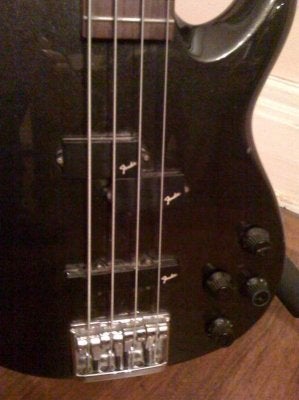robotguitar
Tele-Holic
I just picked up a Fender P-bass Lyte made in Japan, with a serial number dating it to 1985-86 at the Fuji gen plant. Was trying to appraise it, but the only ones I found on ebay had gold hardware, and my bridge and tuning keys are silver in color. The guitar is in good shape but there is scratchiness in on of the tone controls and the active pick-ups seem to be a little hot. Was thinking of selling it so if anyone has any ideas what it might be worth, or how to get rid of the scratchiness, please let me know, Thanks




